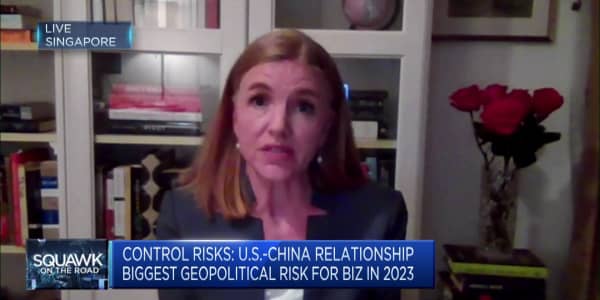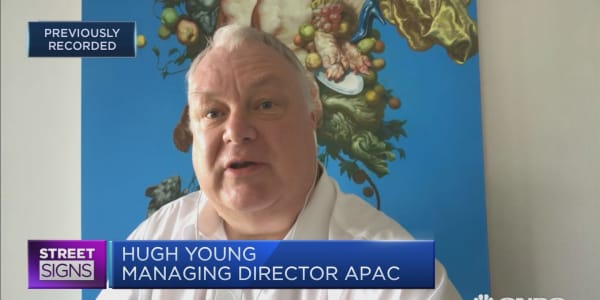Protests have become a global phenomenon after a number of countries erupted in street demonstrations this past year. From regime-ousting outbreaks in Burkina Faso to pro-democracy rallies in Hong Kong, civil unrest was sparked by factors including economic inequality, corruption, and discontent with governments.
These factors are present in several countries, suggesting the protest phenomenon will likely continue, according to a new report from Nomura. Senior political analyst Alastair Newton identifies ten market-relevant countries that look prone to the next bout of large-scale street-level protests. While none of these countries are strangers to rallies, the likelihood of mass demonstrations is on the rise, Nomura said.
The impact on businesses in countries experiencing civil unrest is severe. Labor protests and religious violence increased the potential risk of business disruption in nearly 20 percent of countries during the third-quarter, according to risk consultancy Maplecroft's Civil Unrest Index.
While the countries on Nomura's list fall in the category of emerging and frontier markets, Newton said that isn't always the case: "Notably in many European Union countries, we are increasingly seeing what are essentially protest parties capturing a significant share of the popular vote in elections."
Click ahead to see the 10 countries most vulnerable to large-scale civil unrest.
—By CNBC's Nyshka Chandran. Created November 12, 2014
Argentina
Latin America's third-biggest economy faces myriad financial woes, including one of the world's highest inflation rates and a currency that's near record lows against the U.S. dollar. It also has two debt defaults under its belt.
Workers from some of the country's biggest unions went on strike this summer to express anger over rising prices, declining salaries and the government's apparent inability to control finances.
The country ranks 34 on Transparency International's perceived corruption index and has a Gini coefficient rate of 43.6.
Brazil
Several cities in the world's fifth-largest nation by population were rocked by riots this year in response to the government hosting the 2014 World Cup. With the country still recovering from a recession in 2013, citizens resented the billions spent on renovating football stadiums instead of much-needed infrastructure.
Experts say tensions may escalate if newly-reelected President Rousseff fails tame runaway prices. In September, Brazil's annual inflation rate hit a three-year high of 6.75 percent.
Widespread corruption is also a major complaint. The country's biggest company by market-capitalization, Petrobras, is currently under investigation for bribery.
China
Protests are illegal in the Communist country, but incidents of social unrest are increasing.
Residents are unhappy with the government's one-party rule, censorship, and arbitrary curbs on freedom. Protests this year ranged from farmers contesting land grabs to environmental rallies organized by the middle classes and ethnic minority riots.
Despite higher wages, residents are concerned about widespread unemployment. Recent purchasing managers' indices (PMI) from Beijing and HSBC show manufacturing employment contracting in 2014.
Iran
International sanctions have crippled the economy of the Islamic Republic, with food prices increasing 6 to 12 percent over the past year, according to official data.
While the outlook has improved somewhat with President Rouhani in office, high unemployment, the restriction of political freedoms and violence against women remain hot-button issues.
In October, thousands demanded that officials end the recent spate of acid attacks on young women for wearing clothing deemed inappropriate by conservatives. Citizens are also opposed to the government giving more freedoms to the morality police and plainclothes militia, which tend to leave acts of police brutality unchecked.
Nigeria
Terrorism is the biggest risk facing Africa's largest economy as militant group Boko Haram stages suicide bomb attacks and kidnappings across the country.
The group, labeled "terrorists" by the U.N. Security Council this year, has been at large for five years and aims to establish an Islamic state.
Families have gathered outside presidential offices in the capital of Abuja to demand more action against the group after over 200 schoolgirls were kidnapped six months ago.
Russia
President Vladimir Putin may be enjoying relatively high levels of domestic popularity, but anti-Kremlin sentiment is on the rise. In September, thousands turned up for the All-Russian March for Peace in Moscow against the country's involvement in the eastern Ukraine conflict.
Domestic issues are also at the forefront of anti-government feelings. A new survey from Levada Centre in October showed ordinary people would rather campaign over living standards than political demands.
The country's currency has dropped 30 percent against the U.S. dollar this year and hit a record low of 48.6 just last week. Meanwhile, inflation continues to gallop, with consumer prices rising an annual 8.3 percent in October.
Saudi Arabia
The Arab monarchy has experienced a wave of protests since the Arab Spring in 2011, with the country's eastern province now under pressure over tensions between Sunni and Shia Muslims.
Home to majority of the country's Shia Muslim population, the eastern province is also where the majority Saudi Arabia's oilfields are located. Street protests flared in October after the government sentenced a popular Shia cleric to death.
"Precipitating unrest among Saudi Arabia's Shia community would, I believe, serves the Islamic State's (IS) interests well – not least as it could result in disruption to oil output," said Nomura.
Venezuela
Widely regarded as the world's most dangerous country given record murder rates, Venezuela faces a complex raft of domestic issues.
In the first six months of the year, the nation saw its biggest civil insurrection in over a decade as residents voiced their opposition to soaring crime and chronic shortages of basic goods like toilet paper.
Inflation in the South American economy runs at an eye-popping 65 percent and despite possessing the world's largest proven oil reserves, Venezuela doesn't get paid for almost half of the oil produced because it's given away at below-market prices.
Palestinian Territories
The deadly war between Hamas and Israel on the Gaza Strip this past summer resulted in an outbreak of knife attacks and random acts of violence in Jerusalem, leading to talk of a possible third intifada, Nomura said in its report.
"The authoritative Arab News Digest notes that such talk implies the possibility that the current level of violence could rise sharply but notes that history is not much help determining whether that is likely or what might trigger it," the report added.
Chile
The desire for political reforms is at the heart of Chilean unhappiness with President Michelle Bachelet.
In March this year, the world's top copper exporter saw its biggest political demonstration since 2011; at least 100,000 people asked Bachelet to follow through with ambitious reforms that they hope can close the wide inequality gap.
Most recently, in September, students clashed with police in their demands for the government to speed up education reform.




